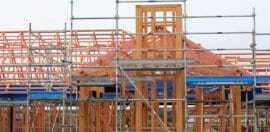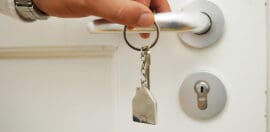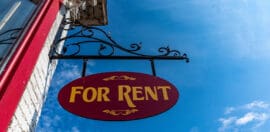The forgotten group put in the ‘too-hard basket’ during Australia’s vaccine rollout

24 May 2021 at 4:19 pm
Homelessness groups say rough sleepers are being forgotten during the vaccine rollout, with a lack of national coordination or strategy making it difficult to protect this vulnerable cohort
Australia is a nation that likes to pride itself on its easy access to healthcare, but for people who are homeless, it’s quite a different story.
When 21-year-old Maddie became homeless in December 2018, after her student accommodation shut down at short notice, getting healthcare was low on her list of priorities.
Maddie endured months of couch surfing, drifting from one place to another, as well as a few nights in between where she was forced to sleep rough.
She said a sense of shame and the stigma around homelessness, plus her lack of money, meant she neglected her health for a long time.
This is common among homeless Australians, and something that has taken on greater significance in light of COVID. Maddie is now speaking out because she worries this group will be left behind during the vaccine rollout.
While she was eventually able to find her own place to live, Maddie said she doesn’t believe she would have accessed the vaccine if she was still experiencing homelessness.
“It’s not your priority when you’re rough sleeping. Your priority is staying alive,” Maddie told Pro Bono News.
“And if the healthcare industry doesn’t have you as their priority either, I would definitely be concerned about being able to access the vaccine.”
Maddie said she gravely feared for rough sleepers across Australia during the vaccine rollout, because in her eyes, “nobody cares”.
“I’m worried that they will become the last priority and not really be cared about even though they’re humans too,” she said.
“Their needs are just as important and they deserve the same amount of healthcare.
“But I’m scared that they will fall through the gaps because they’re not going to be the government’s priority.”
Homelessness groups say rough sleepers need urgent attention
Maddie isn’t the only one concerned.
Australian homelessness groups also say rough sleepers are being forgotten during the vaccine rollout, with a lack of national coordination or strategy making it difficult to get this vulnerable cohort vaccinated.
While people experiencing homelessness can currently be vaccinated due to old age, Aboriginal and Torres Strait Islander identification, chronic medical conditions, severe mental health issues or disability, many rough sleepers do not fall into these priority groups.
Another key barrier for the rough sleepers is that both vaccines currently used in Australia – Pfizer and AstraZeneca – require two doses administered weeks apart.
Advocates point out that this is difficult to coordinate when a person has no fixed address.
Australian Alliance to End Homelessness (AAEH) CEO David Pearson said greater support during the rollout was entirely possible, noting that a lot of effort went into helping people who are homeless get the influenza vaccine every year.
“It’s pretty hard to get access to healthcare if you don’t have a home. That’s why with [the flu vaccine] rollout there’s support that is provided to homelessness agencies directly,” Pearson told Pro Bono News.
“But there’s been very little national coordination and very little discussion about how homelessness agencies are supposed to support people who have no home to access the COVID vaccine.
“This issue seems to be in the too-hard basket for governments, particularly the federal government. And we think that it needs to receive some priority attention.”
Pearson would love to see more rough sleepers given proper accommodation and housing, but he knows this cannot happen immediately.
He said this made it imperative for a public health approach to be taken, including better dissemination of information and a plan for follow-up vaccinations.
Pearson added that greater financial support was also needed for homelessness agencies – who were largely charity-funded and/or relied on government funding.
“We don’t expect GPs to self-fund the rollout to their patients. So why do we expect homelessness agencies to self-fund the rolling out of the vaccine, which is a highly specialised health service?” he said.
“The Commonwealth has allocated all these priority cohorts and inside those cohorts, there are a number of people who are homeless.
“It’s all well and good to put them on a list, but actually getting the jabs into the arms is a whole other thing. And there just isn’t enough focus or planning or support for that to occur as far as we can see.”
Calls for national COVID-19 rough sleeping response plan
Homelessness groups note that scepticism around getting COVID-19 vaccinations is reportedly higher among people experiencing homelessness than the general population, meaning a targeted education campaign was needed.
Pearson said it was not surprising there was a high level of scepticism among this group, especially since many had been let down when accessing government services in the past.
He said another issue was that there were no statistics around how many rough sleepers were being vaccinated.
Just as concerning for Pearson was the lack of reliable statistics on how many rough sleepers there were in general.
“You can’t change something you don’t measure. And in a practical sense, we don’t measure how many people experience homelessness in Australia,” he said.
“We measure it in the census every five years. But the moment the census data comes out it’s already two years out of date.
“So we don’t know how many people are homeless. We don’t know how many people who are homeless die every year. And we certainly don’t know how many homeless people are currently being vaccinated.”
The federal government says looking after people experiencing homelessness during the vaccine rollout is a state and territory responsibility.
But the AAEH is calling on the federal government to show leadership by urgently implementing a COVID-19 National Rough Sleeping Homelessness Pandemic Response Plan.
Pearson warned of the consequences if the government failed to take action.
He said if Australia was to have another outbreak of the virus, then we would see increased mortality rates of people sleeping rough.
Unvaccinated rough sleepers could also potentially be major contributors to community transmission of the virus.
“But if we were to get on the front foot, we could make significant improvements to the way in which some of the most vulnerable people in our community go about their lives,” he said.
“We could actually prevent needless deaths of people who are dying on the streets every year.”
Pro Bono News has contacted the federal Minister for Homelessness Michael Sukkar for comment.
If you are experiencing, or at risk of homelessness, you can ring this 24-hour Victorian hotline for help on 1800 825 955.








This article would have benefited from talking to public health units that ARE actually vaccinating rough sleepers. In Inner City Sydney last week, a pop-up clinic run in partnership between local health and homelessness services administered Covid vaccines to 116 homeless people in a day; a similar clinic held at Exodus foundation administered flu vaxx to 133 people. These clinics have been planned and run in partnership between local agencies, both govt and NGO, as has the successful response to safely accommodating rough sleepers since the pandemic began in March 2020.
Is the photo in the pubic domain? Creative Commons licensed? May want to use it for a derivative work – not for profit